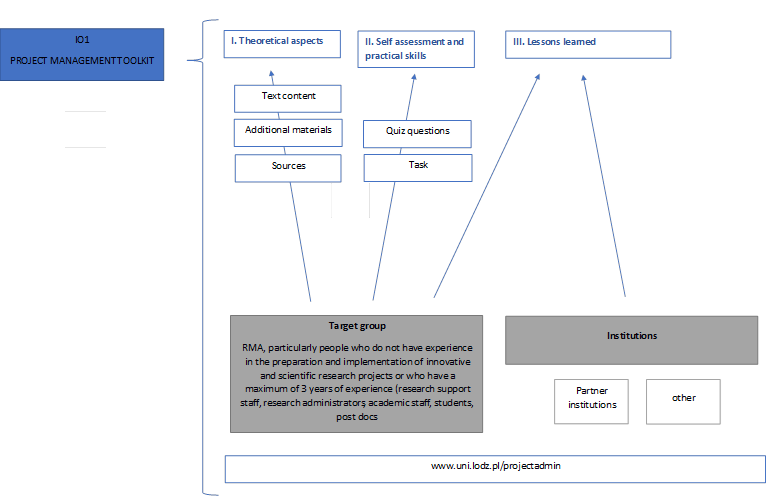Introduction To The Course
The Admin toolkit is a result of the 12-month work carried out by a team of experts representing partner institutions, including:
- University of Lodz – the Leader of the task aimed at developing the toolkit,
- Association for Internalization of Education and Science
- Gozdarski Institut Slovenije
- Hochschule Harz
- Vilniaus Gedimino Technicos Universitetas
Prior to the toolkit development, in 2021, the project partners carried out surveys to identify the needs of the target group in particular. The surveys involved both experienced and less experienced managers from different countries.
The project is addressed to Research Managers Administrators (abbr.: RMA). Since both knowledge and experience in the field of project management and administration determine the content and the level of difficulty of the material, the partners assumed that the target group will include in particular people who do not have experience in the preparation and implementation of innovative and scientific research projects, or who have a maximum of 3 years of experience, including: research support staff, research administrators (early-stage research administrators), academic staff (including scientific research staff), students (including PhD students), postdocs. They can be employed at universities or in research institutions, companies, municipalities, or they can be self-employed, or studying.
The ADMIN toolkit has been divided into three main parts: I. Theoretical Aspects; II. Self-Assessment and Practical Skills; III. Lessons Learnt (Picture 1).

Theoretical aspects
in this part, the participants will acquire basic knowledge in project management at the stage of project preparation and administration. The material has been developed in the form of modules, which means that the participant can go through the whole course, but they can also focus on selected elements thereof. It consists of two main parts: the first one is focused on selected tools for preparing projects, while the other one focuses on their administration. The material covers soft aspects of project implementation, including elements of communication or ethics.
Taking into account the diversity and, above all, the available large number of materials on project management, the authors focused on the key elements of project preparation and administration, which is particularly important for personnel with no or little relevant experience, who, when preparing or implementing a project, often face difficulties, for instance in selecting information/guidelines to facilitate the process of working on the project.
Therefore, the intention concerning material preparation was to provide the participants with the basic contents and then refer them to the materials which would help them to extend their knowledge on their own (Sources). Downloadable materials represent an important and useful component of the toolkit (available as doc. or xls. files), which the participants can use not only to deliver the tasks (see Part I. Self-assessment and Practical Skills), but also in their professional work (e.g. budget or workplan in an Excel file or a stakeholder map).
Self-assessment and practical skills
this part consists of two elements, i.e. tests that allow the participant to quickly check how much knowledge he/she has acquired (the tests consist of a set of closed questions with answers) and tasks to be performed. The tasks have been prepared for each part of the toolkit; they guide the user step by step through the process of the selected phase of work on the project. The downloadable tools mentioned in Part I. Theoretical Aspects are intended to facilitate this task.
Lessons learnt
this part presents the experience gathered by all partners during the project preparation or implementation (administration) phase. In this part, cases were presented that are of significance not only from the perspective of the target group (presentation of problems identified in selected projects), but also from the perspective of the represented institutions (presentation of examples of solutions implemented by institutions supporting RMA in the project preparation and implementation).
The ADMIN toolkit allows the target group to:
- gain the knowledge in the field of project implementation on each stage of the project life cycle; get equipped with the ability to use project management tools in practice;
- understand the specificity of research and innovation project; gain the knowledge on the partners’ best practices (it allows one not to recreate what has already been discovered);
- develop language skills in project management. The toolkit content is universal and thus easy to apply to research, innovation, and other projects.
